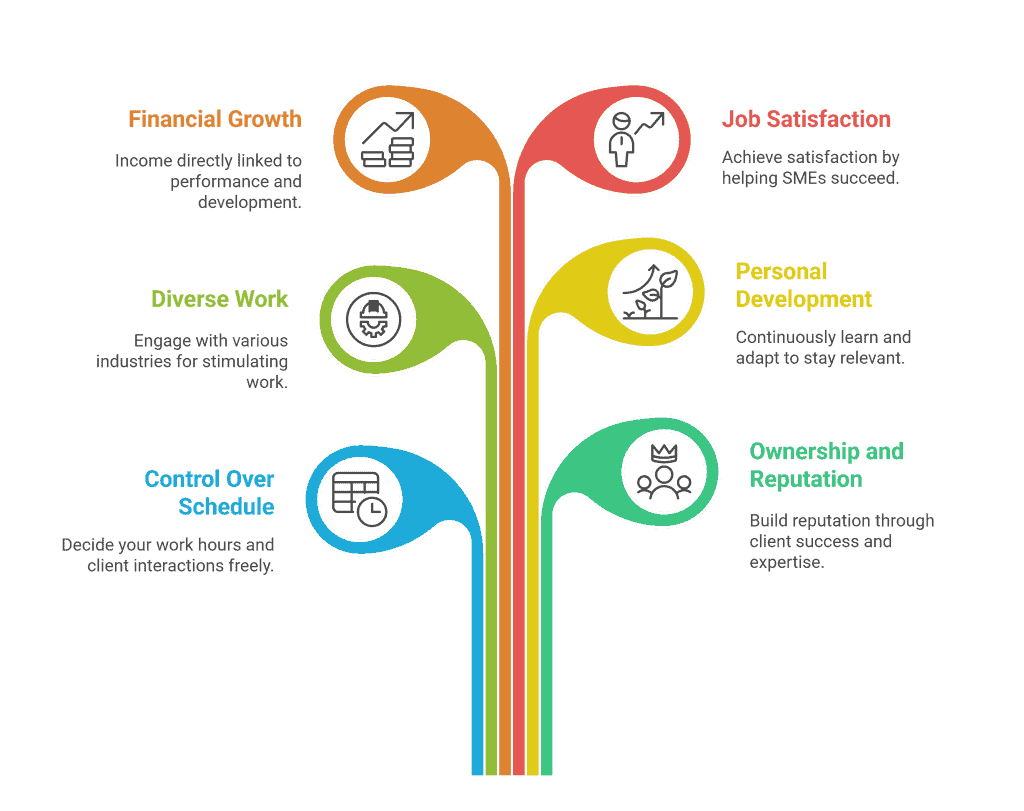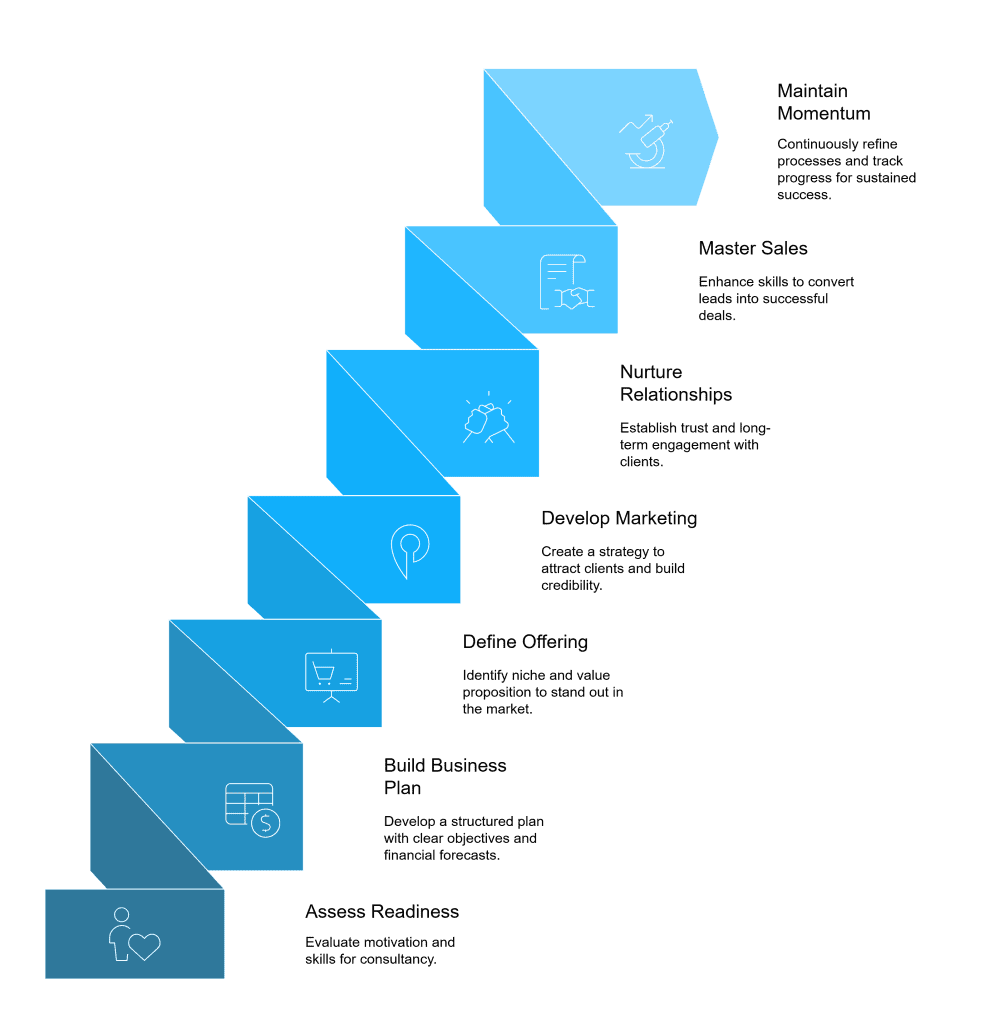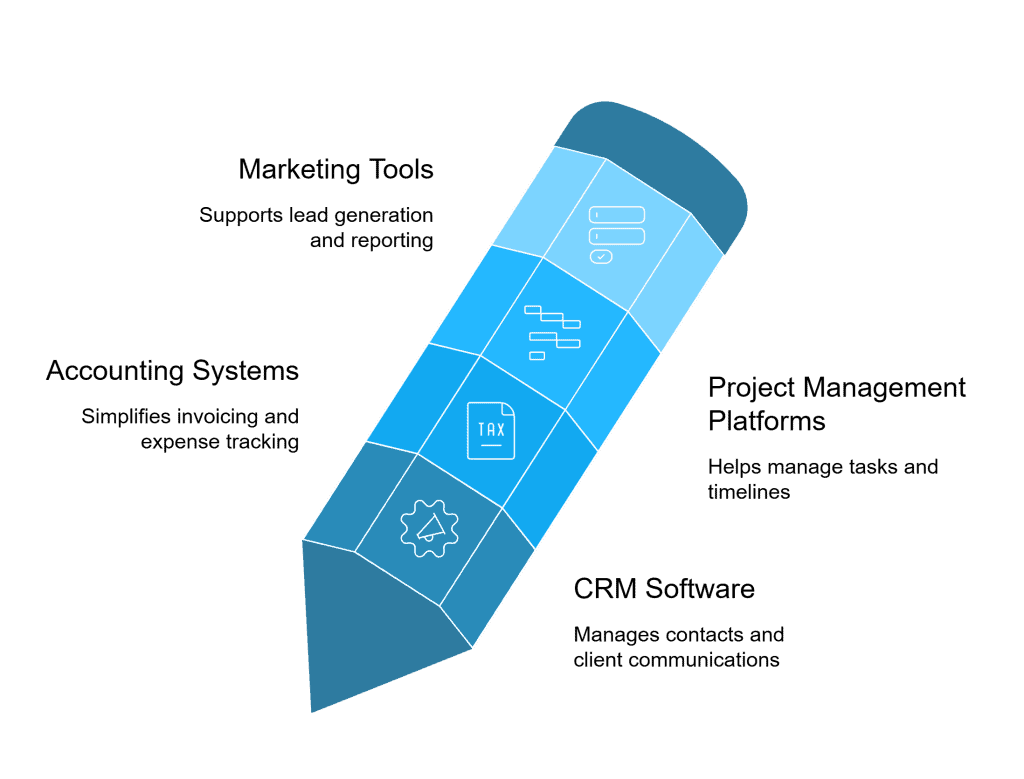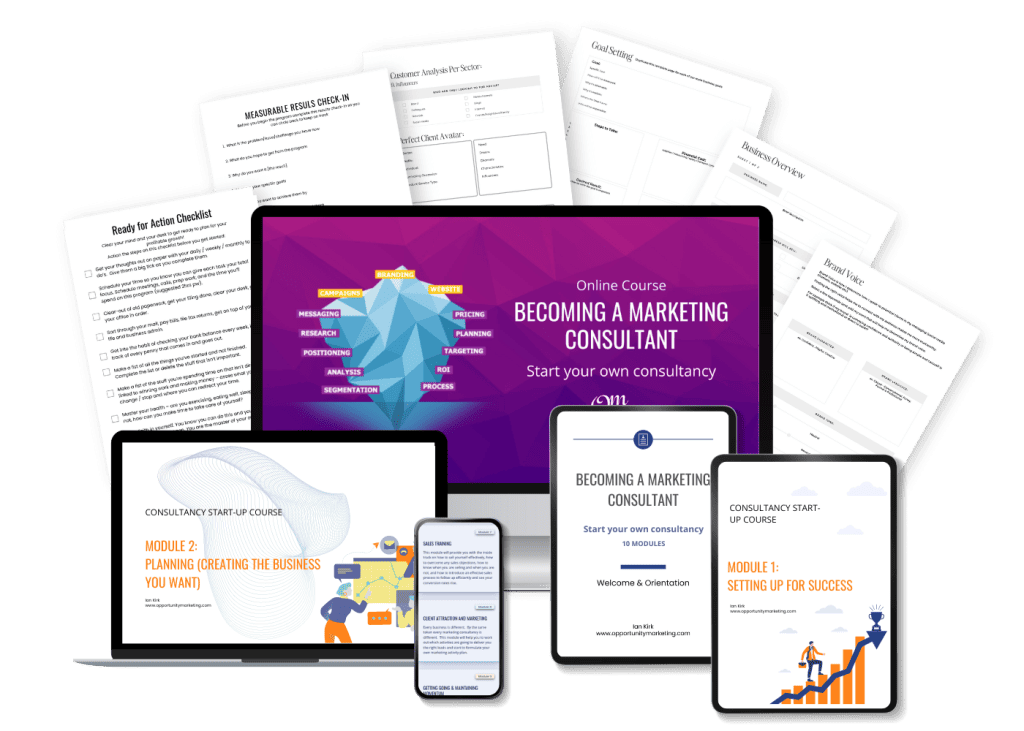Become a Marketing Consultant
How to Become a Successful Marketing Consultant

The Rise of Marketing Consultancy as a Career Path
Becoming a marketing consultant represents one of the most rewarding professional transitions for experienced marketers. It offers independence, flexibility, and the opportunity to use your strategic expertise to help businesses grow. Many marketing professionals working within corporate structures often reach a point where they crave greater control, creative freedom, or a better work-life balance. Marketing consultancy provides that opportunity, enabling experienced marketers to apply their knowledge directly to helping clients achieve tangible, measurable business results.
The modern business landscape in the UK is increasingly favouring independent consultants who can offer expert, impartial advice. With small and medium-sized enterprises (SMEs) driving much of the economy, there’s a rising need for marketing professionals who can translate strategic insight into commercial success. Marketing consultants help fill that gap, providing clarity and direction for business owners who often feel overwhelmed or uncertain about how to approach their marketing effectively.
The Becoming a Marketing Consultant course from Opportunity Marketing gives experienced marketers the practical tools, structure, and confidence to launch and grow their own consultancy successfully. It provides step-by-step guidance on defining your service offering, attracting clients, and building a profitable business supported by proven templates and processes. Through expert-led training and real-world insight, the course helps professionals transition smoothly from employment to independence while achieving measurable business success. Contact Us: 0333 320 4108 or info@opportunitymarketing.co.uk.
Understanding the Role of a Marketing Consultant
A marketing consultant is not simply a marketing manager working independently. The role is more strategic, focusing on advising and guiding businesses rather than delivering individual marketing activities. Consultants work closely with business owners and directors to identify what their company needs to achieve its growth objectives. They analyse data, assess opportunities, develop customised strategies, and help their clients execute marketing plans effectively.
A successful consultant is also a problem-solver. They diagnose where marketing efforts are going wrong and identify solutions to improve performance. Unlike agencies that may be biased toward particular services, consultants offer impartial advice and focus on overall business outcomes. Their goal is to help businesses make better marketing decisions, often by clarifying objectives, aligning budgets with strategy, and identifying the right channels for engagement.
For many SMEs, marketing consultants become trusted advisors. Their input helps shape everything from brand positioning and messaging to campaign planning and customer acquisition strategies. This makes the role not only commercially significant but also personally fulfilling for those who enjoy making a measurable difference to business performance.
Why Experienced Marketers Are Best Suited to Consultancy
Experienced marketers bring a wealth of practical knowledge, industry insight, and leadership experience that is critical for consultancy success. Individuals with three to five years of marketing management experience or higher are often well-positioned to make the leap. These professionals already understand how marketing contributes to business performance, can think strategically, and are comfortable managing multiple priorities.
Transitioning into consultancy also suits those who feel constrained by corporate structures. Many seasoned marketers reach a stage where internal bureaucracy or office politics hinders their ability to create meaningful change. Becoming a consultant allows them to focus purely on outcomes, helping businesses grow, generating value, and working with clients who appreciate their expertise.
It’s also ideal for professionals seeking a more flexible working model. Many consultants choose self-employment to achieve better work-life balance, particularly after years in demanding management positions. Some are parents returning to work after a career break, while others are professionals made redundant who want to use the opportunity to start something new. The unifying factor is the desire to use their skills in a more independent and rewarding way.
The Benefits of Becoming a Marketing Consultant

Working for yourself offers numerous benefits that extend beyond financial rewards. The most obvious advantage is control over your schedule, your clients, and your earning potential. As a consultant, you decide which businesses to work with, what services to provide, and how to structure your working day.
There’s also a strong sense of ownership that comes with running your marketing consultancy. The results you achieve for clients directly reflect your expertise and effort. When clients succeed, your reputation grows, leading to referrals and long-term stability. Over time, such expertise can evolve into a sellable business asset or a consultancy network of your own.
Other key benefits include:
- Diverse Work: You’ll work with various clients across multiple industries, keeping your work stimulating and intellectually challenging.
- Personal Development: Consulting requires continual learning and adaptation, keeping your skills sharp and relevant.
- Financial Growth: There is no salary cap; income directly correlates with performance and business development efforts.
- Job Satisfaction: Helping SMEs achieve clarity, confidence, and measurable success brings a strong sense of accomplishment.
The combination of autonomy, challenge, and reward makes consultancy one of the most attractive career choices for experienced marketing professionals.
Common Challenges and How to Overcome Them
While consultancy offers many rewards, it also presents challenges that require preparation and resilience. One of the first hurdles new consultants face is managing inconsistent income. During the early months, revenue may fluctuate as you build a client base. Financial planning and realistic goal setting are critical for completing this phase successfully.
Another common challenge is learning how to “sell yourself”. Many experienced marketers are confident in promoting products or services but find it uncomfortable to market their expertise. Overcoming this problem requires adopting a structured sales process and understanding that selling consultancy services is about solving problems, not making hard pitches. Opportunity Marketing’s training addresses these issues through its dedicated Sales Training module, which helps consultants master lead conversion.
Administrative tasks can also prove daunting. As a self-employed professional, you’ll need to manage contracts, invoicing, taxes, and compliance. Creating standardised processes early and using reliable business management tools helps minimise these pressures.
Perhaps the greatest challenge is maintaining momentum. Once the initial excitement fades, consultants must stay disciplined, network regularly, and continue refining their service offerings. Joining a professional community, such as Opportunity Marketing’s Associate Consultant Programme, provides valuable support and accountability during this stage.
Step-by-Step Guide: How to Become a Successful Marketing Consultant
Transitioning into consultancy requires structured planning and thoughtful execution. The following steps provide a roadmap to help you build a profitable, sustainable business.

Step 1: Assess Your Readiness and Motivation
Start by evaluating why you want to become a consultant. Success in consultancy depends on mindset as much as skillset. You’ll need to be self-motivated, adaptable, and comfortable with uncertainty during the early stages.
Consider your professional strengths, personal circumstances, and risk tolerance. Ask yourself:
- Are you ready to manage your workload and business operations?
- Do you have the financial buffer to support yourself during the setup period?
- What industries or business types are you most passionate about serving?
This stage is about self-awareness. Identifying your motivation will shape the type of consultancy you build and the clients you attract.
Step 2: Build a Clear Business Plan
A strong business plan is the backbone of a successful consultancy. It provides clarity on your objectives, service offerings, pricing structure, and target market.
Start with defining your mission and goals; what do you want your consultancy to achieve in its first year?
Next, outline your service model. Will you focus purely on marketing strategy, or will you include mentoring and training? Consider your pricing options, whether project-based, retainer-based, or hourly consulting.
Financial planning is equally vital. Forecast your start-up costs, expected revenue, and monthly expenses. This helps you identify your break-even point and track progress over time. A structured plan not only helps you stay focused but also demonstrates professionalism to potential clients and partners.
Step 3: Define Your Offering and Positioning
Positioning determines how the market perceives your consultancy. It’s not enough to be “a marketing consultant”; you need to be known for something specific. Identify your niche, whether it’s SMEs, service businesses, B2B organisations, or local enterprises. Then, refine your value proposition by asking: what problems do I solve, and why should clients choose me?
Developing your positioning also involves setting clear pricing that reflects your value. Avoid undercharging early on, as it can lead to burnout and undervaluation of your expertise. Instead, communicate the outcomes you deliver, such as improved ROI, clarity, or business growth.
Opportunity Marketing’s Positioning & Offering module provides templates and frameworks to help consultants define their USP, ideal clients, and pricing models effectively.
Step 4: Develop a Marketing Strategy for Your Consultancy
Marketing your own consultancy is essential to attract clients and build credibility. Begin by developing a strategy that aligns with your business goals and audience.
Start with a strong personal brand, a professional website, an updated LinkedIn profile, and a consistent visual identity. Use content marketing to demonstrate expertise through blog posts, webinars, and thought leadership. Networking, referrals, and testimonials play an equally critical role in building trust.
Digital marketing channels such as email newsletters, paid social media ads, and targeted LinkedIn campaigns can further expand your reach. The key is consistency and clear messaging that communicates the value you bring to clients.
The Client Attraction and Marketing module in OM’s course walks consultants through developing tailored marketing activity plans that generate high-quality leads.
Step 5: Build and Nurture Client Relationships
Client relationships are the foundation of long-term consultancy success. Building trust takes time, but it leads to repeat business and referrals that form the core of a sustainable practice.
Start by understanding your client’s business inside out, their goals, pain points, and market position. Use this insight to provide recommendations that are realistic, data-driven, and aligned with their commercial objectives.
Communication is key. Regular updates, transparent reporting, and proactive problem-solving reinforce client confidence. Consultants who make their clients feel supported and understood tend to enjoy stronger relationships and longer engagements.
Opportunity Marketing’s Client Delivery Process module includes frameworks to help consultants structure engagements professionally and deliver consistent value.

Step 6: Master the Sales Process
A major differentiator between consultants who thrive and those who struggle is their ability to convert leads effectively. Selling consultancy services requires confidence, empathy, and a clear understanding of client psychology.
A structured sales process should include initial discovery calls, tailored proposals, and professional follow-ups. Focus on identifying the client’s challenges and aligning your solution with their goals. Always speak in terms of outcomes rather than activities.
OM’s Sales Training module is designed specifically to help consultants develop this capability, covering how to handle objections, read buying signals, and close deals confidently.
Step 7: Maintain Momentum and Continue Learning
After securing initial clients, maintaining motivation becomes essential. Consultants must continuously refine their processes, improve their skills, and track progress.
Time management and discipline are critical. Develop weekly routines that balance client delivery with marketing, sales, and administration. Review performance regularly and adjust your approach when necessary.
Staying connected to other consultants can also help. Peer support networks provide accountability and new ideas. Opportunity Marketing’s Support Network module emphasises building professional relationships that sustain long-term growth.
Building Your Personal Brand as a Marketing Consultant
Your brand is more than just a logo or website. It’s how clients perceive your professionalism, credibility, and value. Strong branding helps attract clients who align with your approach and values.
Start with consistency. Use professional photography, clear messaging, and a tone of voice that reflects your personality and expertise. Position yourself as an authority by sharing insights, case studies, and results through platforms such as LinkedIn, YouTube, and email newsletters.
Testimonials and client case studies are powerful trust builders. Encourage clients to share their experiences working with you, and showcase measurable outcomes. Thought leadership, such as guest articles or speaking engagements, further enhances credibility and expands your network.
Tools, Templates, and Resources That Support Consultants
Running a consultancy efficiently requires reliable tools and structured systems. These not only save time but also create a professional experience for clients.
Essential tools include:
- CRM Software: To manage contacts, sales pipelines, and client communications.
- Accounting Systems: Tools like Xero or QuickBooks simplify invoicing and expense tracking.
- Project Management Platforms: Systems such as Asana or Trello help manage client tasks and timelines.
- Marketing Tools: Google Analytics, LinkedIn Ads, and email automation platforms support lead generation and reporting.

OM’s course provides proven templates such as proposal frameworks, client onboarding checklists, and marketing activity planners, giving consultants the structure needed to operate efficiently from day one.
How Opportunity Marketing Helps You Build a Thriving Consultancy
Opportunity Marketing’s Become a Marketing Consultant course is a comprehensive, 10-module online programme designed for experienced marketers ready to transition into self-employment. It combines decades of consultancy experience, practical frameworks, and real-world insights to fast-track your success.
The course covers all aspects of consultancy development, including business setup, strategic planning, positioning, client delivery, sales training, and momentum building. Participants also gain access to valuable supporting resources — tools, templates, and a detailed workbook to document their progress.
For those seeking additional support, the Associate Consultant Programme provides six months of mentoring, listing on the Opportunity Marketing website, and access to centrally generated projects. This additional layer of guidance helps consultants stay on track and establish income faster.

Long-Term Growth and Expansion Opportunities
Once established, marketing consultants can expand their services and income streams in several ways. Some build teams of associate consultants to manage a larger client base. Others diversify into training, coaching, mentoring or digital product creation.
Growth also comes from continuous professional development. Attending industry events, participating in webinars, and staying updated on market trends strengthen credibility and keep your services relevant.
Scaling your consultancy requires the same strategic mindset you bring to your clients, clear objectives, structured planning, and measurable performance tracking. Those who consistently apply these principles can achieve substantial long-term success and stability.
Why Work with Opportunity Marketing
Opportunity Marketing is a trusted consultancy that has been guiding SMEs and marketing professionals since 2008. Its founder, Ian Kirk, has more than 25 years of experience developing marketing strategies and mentoring consultants across multiple industries.
The company’s strategy-first philosophy sets it apart from traditional agencies. Every process is designed to help businesses make data-driven, ROI-focused decisions that lead to sustainable growth. Consultants trained through Opportunity Marketing gain access to these same methodologies, enabling them to deliver exceptional results for clients while building their own reputation as trusted advisors.
Working for OM means joining a network that prioritises strategic integrity, transparency, accountability, and measurable outcomes. This commitment to quality and client success has established Opportunity Marketing as a respected leader in the marketing consultancy space.

Take Control of Your Future and Build a Business You Believe In
Becoming a marketing consultant is both a professional and personal transformation. It’s about reclaiming control, using your experience to make a tangible impact, and creating a business that reflects your values and ambitions.
The path to consultancy success requires careful planning, strong discipline, and continuous development, but the rewards are substantial. With the right guidance, proven frameworks, and expert support, you can fast-track your transition and start building a thriving consultancy that delivers value to your clients and fulfilment to you.
Opportunity Marketing’s Become a Marketing Consultant course offers exactly that: a structured, comprehensive programme designed to equip you with the knowledge, tools, and confidence to succeed. Whether you’re leaving corporate life, seeking a new challenge, or looking to transform your career, this is your chance to create a business that works on your terms and grows on your expertise.
Work With Opportunity Marketing
Building a successful marketing consultancy starts with the right strategic foundation, and that’s exactly what Opportunity Marketing provides. Whether you’re looking to start your consultancy, strengthen your marketing expertise, or refine your business strategy, our proven frameworks and expert-led courses give you the clarity and confidence to achieve your goals. We’ve helped hundreds of professionals transition into consultancy, develop powerful client propositions, and create profitable, independent businesses built on measurable results.
If you’re ready to take control of your future and turn your marketing experience into a thriving consultancy, we’d love to support your next step.
Visit: opportunitymarketing.co.uk Call: 0333 320 4108
Email: info@opportunitymarketing.co.uk


Ian Kirk
Founder at Opportunity Marketing
Ian is the founder of Opportunity Marketing marketing, with over 18 years of experience in successfully setting up marketing departments, creating marketing strategies and implementing these strategies across a wide number of SME companies in both the B2B and B2C sectors through a variety of channels.






